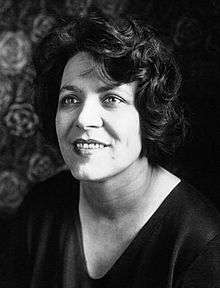Marie-Louise Damien

Marie-Louise Damien (December 5, 1889 – January 31, 1978), better known by the stage name Damia, was a French singer and actress.
Robert Hollard
Born in Paris, Marie-Louise Damien was 18 years old when she met the singer/songwriter Robert Hollard who gave her lessons that led to her professional debut. At the time, Hollard was married to the singer, Fréhel, but the marriage was a difficult one and soon ended. After leaving his wife, Hollard began an affair with his protégé.
Felix Mayol and Loie Fuller
After being seen by Félix Mayol, one of the leading male singing stars at the time, he hired her to perform at his concerts. Despite this, her career evolved slowly, taking second billing for a number of years but with help in her stage presentation from the American dancer, Loie Fuller, she eventually became a singing star. At the beginning of World War I she opened Le Concert Damia, in Montmartre, where she became the first star ever to have a single spotlight trained on her face, bare arms and hands. From this point in her career she became the most important exponent of the chanson réaliste genre until Édith Piaf came along in 1936. Her nickname was "la tragédienne de la chanson", and amongst her big hits were "Les goélands", "Johnny Palmer", "C'est mon gigolo" and "Tu ne sais pas aimer"—the latter song became a theme for French sufferers of AIDS.
Films
In 1927, she appeared in the film, Napoléon directed by Abel Gance with early silent film stars Antonin Artaud, Philippe Hériat, Annabella, and Suzanne Bianchetti. Her other film successes included "Sola" and "Notre Dame De Paris", alongside Anthony Quinn. Damia had enduring appeal that stretched to audiences as far away as Japan where she toured in 1953.
Farewell tour
A few years later she did a farewell tour, ending her more than forty-year career in a double bill with Marie Dubasin front of a full house at the Paris Olympia. Her actual swansong, however, was singing "Les Croix" on "La joie de vivre d'Edith Piaf", in 1956.
When asked in 1974 by the Anglo-French biographer David Bret to divulge the secret of her long life and fabulous voice, Damia replied, "Three packs of Gitanes a day!"
Death
Damia died at La Celle-Saint-Cloud, a western suburb of Paris, and was interred in the Cimetière de Pantin. Today, she is considered to be the third greatest singer of chansons réalistes, after Edith Piaf and Barbara.
Selected filmography
- Calais-Dover (1931)
External links
- Damia at the Internet Movie Database